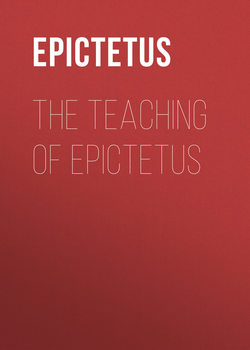The Teaching of Epictetus

Реклама. ООО «ЛитРес», ИНН: 7719571260.
Оглавление
Epictetus. The Teaching of Epictetus
INTRODUCTION
CLEANTHES’ HYMN TO ZEUS.7
BOOK I
CHAPTER I. the beginning of philosophy
CHAPTER II. on the natural conceptions
CHAPTER III. the master-faculty
CHAPTER IV. the nature of the good
CHAPTER V. the promise of philosophy
CHAPTER VI. the way of philosophy
CHAPTER VII. to the learner
CHAPTER VIII. the cynic.24
BOOK II
CHAPTER I. on genuine and borrowed beliefs
CHAPTER II. the game of life
CHAPTER III. things are what they are
CHAPTER IV. three steps to perfection
CHAPTER V. that a man may be both bold and fearful
CHAPTER VI52. the wise man’s fear and the fool’s
CHAPTER VII. appearances false and true
CHAPTER VIII. how we should think as god’s offspring
CHAPTER IX. the open door
CHAPTER X. know thyself
CHAPTER XI63. how we should bear ourselves towards evil men
CHAPTER XII. the voyage of life
CHAPTER XIII. the mark of effort
CHAPTER XIV. faculties
CHAPTER XV. returns
CHAPTER XVI. the price of tranquillity
CHAPTER XVII. a choice
CHAPTER XVIII. that where the heart is the bond is
CHAPTER XIX. that we lament not from within
CHAPTER XX. that a man may act his part but not choose it
CHAPTER XXI. distinctions
CHAPTER XXII. that a man is sufficient to himself
CHAPTER XXIII. that every man fulfill his own task
CHAPTER XXIV. the world’s price for the world’s worth
CHAPTER XXV. aims of nature
CHAPTER XXVI. the mind’s security
CHAPTER XXVII. that a man should be one man
BOOK III
CHAPTER I. obligations
CHAPTER II. against epicurus
CHAPTER III. against the epicureans and academics
CHAPTER IV. on slavery
CHAPTER V. to the administrator of the free cities, who was an epicurean
CHAPTER VI. on statecraft
CHAPTER VII. on friendship
CHAPTER VIII. time and change
CHAPTER IX. on solitude
CHAPTER X. against the contentious and revengeful
BOOK IV
CHAPTER I. of religion
CHAPTER II. of providence
CHAPTER III. of providence
CHAPTER IV. god in man
CHAPTER V. of divination.105
BOOK V
CHAPTER I. the behaviour of a philosopher
CHAPTER II. on habit
CHAPTER III. on disputation
CHAPTER IV. that we should be slow in accepting pleasure
CHAPTER V. that we should be open in our dealings
CHAPTER VI. that half true may be all false
CHAPTER VII. that each man play his own part
CHAPTER VIII. that we should be careful of the soul as of the body
CHAPTER IX. the measure of gain
CHAPTER X. the worth of women
CHAPTER XI. a dull nature
CHAPTER XII. of adornment of the person
CHAPTER XIII. why we should bear with wrong
CHAPTER XIV. that everything hath two handles
CHAPTER XV. on certain false conclusions
CHAPTER XVI. perception and judgment
CHAPTER XVII. that the philosopher shall exhibit to the vulgar deeds, not words
CHAPTER XVIII. ascesis
CHAPTER XIX. tokens
CHAPTER XX. that the logical art is necessary
CHAPTER XXI. grammarian or sage
CHAPTER XXII. ACCOMPLISHMENTS
CHAPTER XXIII. constancy
CHAPTER XXIV. how long?
CHAPTER XXV. parts of philosophy
CHAPTER XXVI. memorabilia.126
NOTES ON PRINCIPAL PHILOSOPHIC TERMS USED BY EPICTETUS
Отрывок из книги
1. Wouldst thou be good, then first believe that thou art evil.
2. The beginning of philosophy, at least with those who lay hold of it as they ought and enter by the door,9 is the consciousness of their own feebleness and incapacity in respect of necessary things.
.....
1. A certain Roman having entered with his son and listened to one lecture, “This,” said Epictetus, “is the manner of teaching;” and he was silent. But when the other prayed him to continue, he spake as follows: —
Every art is wearisome, in the learning of it, to the untaught and unskilled. Yet things that are made by the arts immediately declare their use, and for what they were made, and in most of them is something attractive and pleasing. And thus when a shoemaker is learning his trade it is no pleasure to stand by and observe him, but the shoe is useful, and moreover not unpleasing to behold. And the learning of a carpenter’s trade is very grievous to an untaught person who happens to be present, but the work done declares the need of the art. But far more is this seen in music, for if you are by where one is learning, it will appear the most painful of all instructions; but that which is produced by the musical art is sweet and delightful to hear, even to those who are untaught in it. And here we conceive the work of one who studies philosophy to be some such thing, that he must fit his desire to all events, so that nothing may come to pass against our will, nor may aught fail to come to pass that we wish for. Whence it results to those who so order it, that they never fail to obtain what they would, nor to avoid what they would not, living, as regards themselves, without pain, fear, or trouble; and as regards their fellows, observing all the relations, natural and acquired; as son or father, or brother or citizen, or husband or wife, or neighbor or fellow-traveler, or prince or subject. Such we conceive to be the work of one who pursues philosophy. And next we must inquire how this may come about.
.....